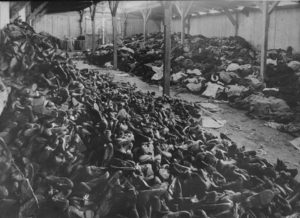On July 19th, I depart for Congo. It will be my first visit.
After serving as Executive Director of Jewish World Watch for a year, I know all too well the horrific statistics illustrating the chaos, lawlessness, and violence that plague the country I will soon see. An estimated 1,100 women are raped every day in Congo. Nearly 6 million people have been killed during more than a decade of war and conflict. Thousands of boys and girls are forced to serve as child soldiers and sex slaves.
The statistics are overwhelming and appalling, but there is nothing like standing face-to-face with survivors. There is nothing like hearing accounts of survival from the source. There is nothing like seeing the impact of the funds and advocacy efforts our JWW family has contributed to the Congolese people since we first engaged there in 2009. There is nothing like bearing witness.
Mentally preparing for the trip has reminded me why I do what I do — why I choose to pursue a career as a Jewish professional that advances global social justice. It’s reminded me why my parents chose my middle name “Lieb” in tribute to Father Mark Liebler, who heroically spoke out against the Catholic Church in the 1960s for its silence during the Holocaust. While Father Liebler was subsequently fired for speaking out, he left a legacy of compassion through his courageous action. Despite the risk to his career, he Did Not Stand Idly By, knowing injustice had occurred in his own community. Indeed, I took the position of Executive Director of JWW because I have felt a deep connection to Jewish World Watch’s mission to fight genocide; to Not Stand Idly By.
Over the past several weeks, I have thought quite a lot about the first time that I engaged in serious learning about genocide as a senior in high school. As part of an incredible program called the March of the Living, I visited the Nazi death camps of Eastern Europe. I remember what it felt like to walk through the gates of Auschwitz and stand alongside the destroyed crematoria, which mechanized the slaughter of more than a million Jews from Poland. I remember standing next to the mound of ashes that made up the memorial at Majdanek Death Camp, which took 800,000 lives in under a year. At the time, I remember thinking that no book, no article, and no discussion could evoke the kind of feelings I felt when standing inside a prisoner barracks and seeing thousands of shoes, eyeglasses, crutches and wheelchairs on display.
I know that this trip will have a similar effect. I have no doubt that I will be moved by witnessing the tremendous impact of our projects on survivors, whether they are survivors of rape, former child soldiers and sex slaves, or babies orphaned by Congo’s wars. Meeting the people beyond the numbers is bound to move me in new ways, and inform our work at Jewish World Watch to help the people of Congo build a brighter future.


